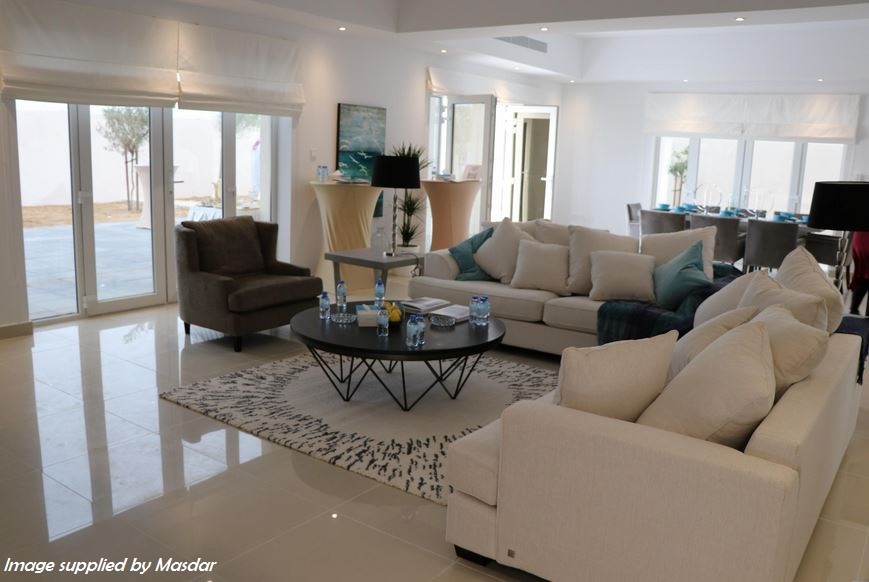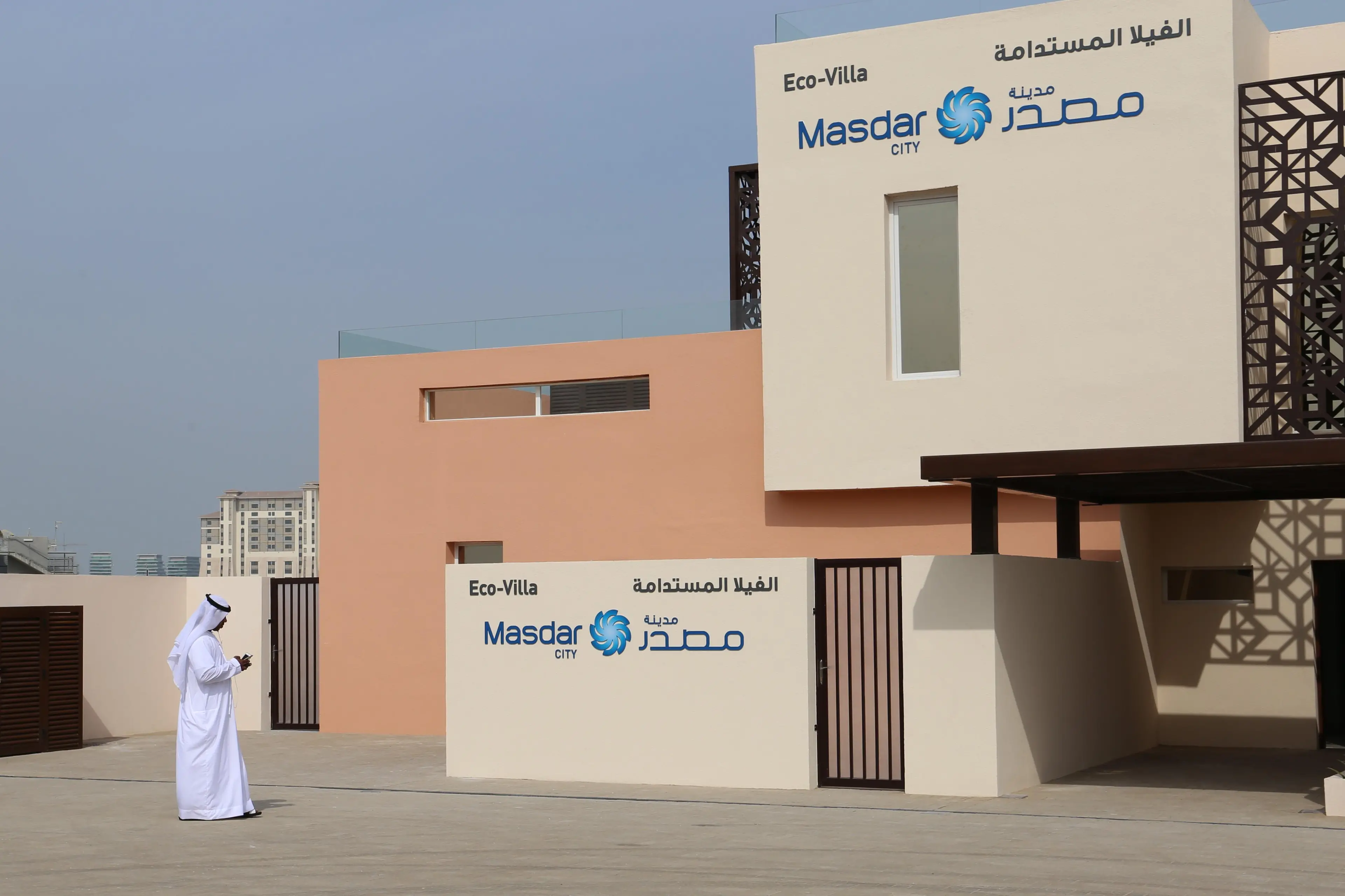PHOTO
23 January 2017
By Nada Al Rifai
At first glance, the new Eco-Villa concept launched at Masdar City last week looks like any other villa in most neighbourhoods across Abu Dhabi emirate. So what makes the concept so special that officials are touting it as the future standard for villas in the United Arab Emirates and beyond?
Its not a breath-taking view, lavish branded interiors or a luxury exterior, but the fact that an environmentally-minded tenant could live there without paying a single dirham in energy bills, and may even wind up making some money.
We have launched the first of its kind Eco-Villa in the region, where the power production is equivalent to consumption all year round, Yousef Baselaib, executive director of sustainable real estate at Masdar City, told Zawya during a tour of the villa last Thursday.
The 405 square-metre unit will use around 72 percent less energy and 35 percent less water than a similar-sized villa in Abu Dhabi, helping to displace an estimated 63 tonnes of carbon dioxide per year.
However, the concept is not only aimed at those concerned about the size of their carbon footprint or worried about the impact of climate change, but homeowners with more basic economic concerns: saving money.
Made in the UAE
While the four-bedroom property is expected to consume just 97 kilowatt hours (kWh) of electricity per square metre, the 87 rooftop solar panels are capable of supplying as much as 40,000 kWh of electricity to the national grid, meaning the villa could actually end up earning its owners money each month.
I can confidently say that the cost of such a villa is equivalent to the cost of any building outside Masdar. Most importantly, 90 percent of the materials used in this villa is produced in the United Arab Emirates, Baselaib said.
Founded over a decade ago by the Abu Dhabi government, Masdar City aims to become one of the most sustainable urban developments in the world. The villa concept is one endeavour under the Masdar programme.
On top of the solar panels, the Eco-Villa reduces energy demand by using optimised natural lighting and low-energy LED lighting, while the water conservation is increased through the use of low-flow toilets, faucets and showers.
First family to move in
The villas performance will be put to the test when an Emirati family takes residence in the home in April this year. The Masdar team will monitor the performance of the villa during both the winter and summer months and after a year they hope to have enough data to launch a commercial version of the prototype.
Water consumption in the Eco-Villa is around one third of that in the regular villa. Thus, it is highly efficient as a starting point, but the consumption pattern of the individuals living in the villa play a key role in energy conservation, and reaching the point where the energy production in the villa is equivalent to the energy consumption, Ramiz Alaileh, head of Powerwise Office at the Regulation and Supervision Bureau, the regulatory body for the water and electricity sector in Abu Dhabi, told Zawya.
 The bureau is collaborating with many partners, including green energy firm Masdar, Abu Dhabi Municipality, and Abu Dhabi Housing Authority, Abu Dhabi Water & Electricity Authority, to bring similar projects to wider global audience.
The bureau is collaborating with many partners, including green energy firm Masdar, Abu Dhabi Municipality, and Abu Dhabi Housing Authority, Abu Dhabi Water & Electricity Authority, to bring similar projects to wider global audience.
As a result, the Masdar team were also keen to make sure the villa would appeal to a global audience, and not just those in the UAE.
During the design phase, we have kept in mind that it suits residents in the UAE as well as those outside the UAE. We made studies, questionnaires, and surveys on how residents expect their house to look like, and we came out with this design that suits all ages and categories, said Baselaib, who was speaking in Arabic.
We (Masdar) have always been pioneers in the field of energy sustainability, and we believe this model is feasible not only in the UAE but everywhere else, he added.
The villa has already earned a Pearl 4 rating, the highest rating possible in the Abu Dhabi Urban Planning Councils Estidama system for rating how environmentally sustainable buildings are.
Masdar City is already home to around 300 full-time students of the Masdar Institute of Science and Technology. Around 2,000 apartments are either under construction or in design through Masdar or third-party investors.
This will bring the residential population at Masdar City to more than 3,500 people over the next three years and within five years officials report that over a third of the project will be completed. Read more here.
For Zawya's Special Coverage of Abu Dhabi Sustainability Week, organised by Masdar, click here.
(Editing by Shane McGinley and Ghaida Ghantous)
Zawya 2017
By Nada Al Rifai
At first glance, the new Eco-Villa concept launched at Masdar City last week looks like any other villa in most neighbourhoods across Abu Dhabi emirate. So what makes the concept so special that officials are touting it as the future standard for villas in the United Arab Emirates and beyond?
Its not a breath-taking view, lavish branded interiors or a luxury exterior, but the fact that an environmentally-minded tenant could live there without paying a single dirham in energy bills, and may even wind up making some money.
We have launched the first of its kind Eco-Villa in the region, where the power production is equivalent to consumption all year round, Yousef Baselaib, executive director of sustainable real estate at Masdar City, told Zawya during a tour of the villa last Thursday.
The 405 square-metre unit will use around 72 percent less energy and 35 percent less water than a similar-sized villa in Abu Dhabi, helping to displace an estimated 63 tonnes of carbon dioxide per year.
However, the concept is not only aimed at those concerned about the size of their carbon footprint or worried about the impact of climate change, but homeowners with more basic economic concerns: saving money.
Made in the UAE
While the four-bedroom property is expected to consume just 97 kilowatt hours (kWh) of electricity per square metre, the 87 rooftop solar panels are capable of supplying as much as 40,000 kWh of electricity to the national grid, meaning the villa could actually end up earning its owners money each month.
I can confidently say that the cost of such a villa is equivalent to the cost of any building outside Masdar. Most importantly, 90 percent of the materials used in this villa is produced in the United Arab Emirates, Baselaib said.
Founded over a decade ago by the Abu Dhabi government, Masdar City aims to become one of the most sustainable urban developments in the world. The villa concept is one endeavour under the Masdar programme.
On top of the solar panels, the Eco-Villa reduces energy demand by using optimised natural lighting and low-energy LED lighting, while the water conservation is increased through the use of low-flow toilets, faucets and showers.
First family to move in
The villas performance will be put to the test when an Emirati family takes residence in the home in April this year. The Masdar team will monitor the performance of the villa during both the winter and summer months and after a year they hope to have enough data to launch a commercial version of the prototype.
Water consumption in the Eco-Villa is around one third of that in the regular villa. Thus, it is highly efficient as a starting point, but the consumption pattern of the individuals living in the villa play a key role in energy conservation, and reaching the point where the energy production in the villa is equivalent to the energy consumption, Ramiz Alaileh, head of Powerwise Office at the Regulation and Supervision Bureau, the regulatory body for the water and electricity sector in Abu Dhabi, told Zawya.
 The bureau is collaborating with many partners, including green energy firm Masdar, Abu Dhabi Municipality, and Abu Dhabi Housing Authority, Abu Dhabi Water & Electricity Authority, to bring similar projects to wider global audience.
The bureau is collaborating with many partners, including green energy firm Masdar, Abu Dhabi Municipality, and Abu Dhabi Housing Authority, Abu Dhabi Water & Electricity Authority, to bring similar projects to wider global audience.
As a result, the Masdar team were also keen to make sure the villa would appeal to a global audience, and not just those in the UAE.
During the design phase, we have kept in mind that it suits residents in the UAE as well as those outside the UAE. We made studies, questionnaires, and surveys on how residents expect their house to look like, and we came out with this design that suits all ages and categories, said Baselaib, who was speaking in Arabic.
We (Masdar) have always been pioneers in the field of energy sustainability, and we believe this model is feasible not only in the UAE but everywhere else, he added.
The villa has already earned a Pearl 4 rating, the highest rating possible in the Abu Dhabi Urban Planning Councils Estidama system for rating how environmentally sustainable buildings are.
Masdar City is already home to around 300 full-time students of the Masdar Institute of Science and Technology. Around 2,000 apartments are either under construction or in design through Masdar or third-party investors.
This will bring the residential population at Masdar City to more than 3,500 people over the next three years and within five years officials report that over a third of the project will be completed. Read more here.
For Zawya's Special Coverage of Abu Dhabi Sustainability Week, organised by Masdar, click here.
(Editing by Shane McGinley and Ghaida Ghantous)
Zawya 2017





















